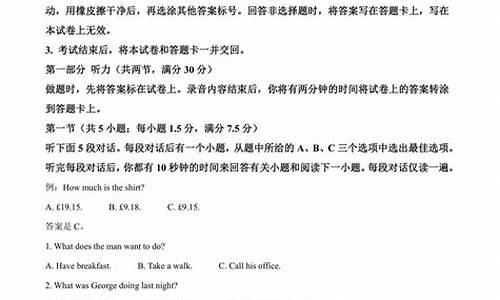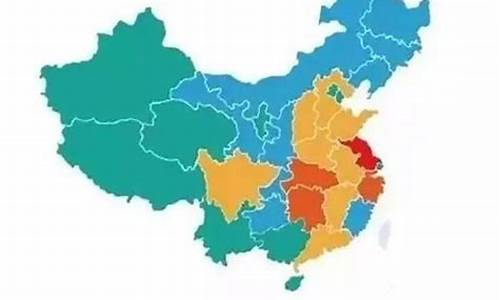您现在的位置是: 首页 > 教育新闻 教育新闻
2007年高考英语全国卷,2007英语高考题
tamoadmin 2024-05-26 人已围观
简介1.专家谈2007高考英语:考场上妥善安排做题时间2.广东高考英语试卷难不难,难度系数解读点评答案解析3.四川近5年高考语文,英语作文题目4.高考英语5.高考英语(上海卷)完型填空真题~~附答案的~~狂赏单词拼写必背一、一个星期七天1. Monday 2. Tuesday 3. Wednesday 4. Thursday 5. Friday 6. Saturday 7. Sunday二、
1.专家谈2007高考英语:考场上妥善安排做题时间
2.广东高考英语试卷难不难,难度系数解读点评答案解析
3.四川近5年高考语文,英语作文题目
4.高考英语
5.高考英语(上海卷)完型填空真题~~附答案的~~狂赏

单词拼写必背
一、一个星期七天
1. Monday 2. Tuesday 3. Wednesday 4. Thursday 5. Friday
6. Saturday 7. Sunday
二、一年十二个月
1. January 2. February 3. March 4. April 5. May
6. June 7. July 8. August 9. September 10. October
11. November 12. December
三、一年四季
1. spring 2. summer 3. autumn 4. winter
四、容易拼写错的数字
1. eighth第八
2. ninth第九
3. forty四十
4. twelfth第十二
5. twentieth第二十
四、亲属称呼
1. daughter (女儿)
2. niece (女性晚辈)
3. nephew (男性晚辈)
4. cousin (同辈兄弟姐妹)
5. aunt (女性长辈)
6. uncle (男性长辈)
五、以下动词加-ed或-ing要双写最后一个字母
1. regret (regretted, regretting) 后悔
2. control (controlled, controlling) 控制
3. admit (admitted, admitting) 承认
4. occur (occurred, occurring) 出现
5. prefer (preferred, preferring) 宁愿
6. refer (referred, referring) 提到
7. forget (forgetting ) 忘记
8. permit (permitted, permitting)允许
9. equip (equipped, equipping) 装备
注意:quarrel, signal, travel中的l可双写(英国英语)也可不双写(美国英语)
六、部分过去式和过去分词不规则变化的动词
1. broadcast (broadcast, broadcast) 广播
2. flee (fled, fled) 逃跑
3. forbid (forbade, forbidden) 禁止
4. forgive (forgave, forgiven) 原谅
5. freeze (froze, frozen) 结冰
6. hang (作“绞死”讲,是规则的;作“悬挂”讲,其过去式过去分词都是hung)
7. lie (作“说谎”讲时,是规则的;作“位于”讲时,其过去式是lay,过去分词是lain)
8. seek (sought, sought) 寻求
9. shake (shook, shaken) 发抖
10. sing (sang, sung) 唱歌
11. sink (sank, sunk/sunken) 下沉
12. spread (spread, spread) 传播
13. swim (swam, swum) 游泳
14. tear (tore, torn) 撕碎
15. weave (wove, woven) 编织
七、意思相近的词
1. check / examine/ test
2. receive / accept
3. destroy /damage
4. celebrate/ congratulate
5. wear / dress
八、注意形容词变名词时的拼写变化
1. long—length 长度
2. wide—width 宽度
3. high—height 高度
4. strong—strength力量
九、以-ic结尾的动词,应先把-ic变为-ick,再加ing或ed
1. picnic (picnicked, picnicking) 野餐
十、个别名词的复数拼写
1. German (Germans) 德国人
2. gulf (gulfs) 海湾
3. handkerchief (handkerchiefs) 手帕
4. hero (英雄),potato (土豆),tomato (西红柿) 等有生命的以-o结尾的名词变复数时要加-es。
5. roof (roofs) 房顶
6. stomach 胃 (其复数是stomachs而不是加es)
十一、注意动词变名词时的拼写变化
1. succeed—success成功
2. pronounce—pronunciation 发音
3. explain—explanation解释
4. decide—decision 决定
5. enter—entrance进入
6. permit—permission 允许
7. refuse—refusal 拒绝
8. consider—consideration 考虑
9. discover—discovery 发现
10. bury—burial 埋葬
11. conclude—conclusion 得出结论
12. arrive—arrival 到达
13. weigh—weight 重量
十二、注意形容词变副词时的拼写变化
1. beautiful—beautifully 美丽的
2. possible—possibly 可能的
3. practical—practically 实际的
4. particular—particularly 特别的
5. successful—successfully 成功的
十三、其它必背单词
1. abroad 国外
2. absence n. 缺席 (absent adj.)
3. accepted (NMET1997)
4. accident事故 (accidental adj. 偶然的,accidentally adv. 偶然地)
5. achievement成就 (achieve v. 获得)
6. address地址
7. admire钦佩
8. admitting (2000北京春季卷)
9. agreement 协议
10. agriculture农业 (agricultural adj. 农业的)
11. altogether总共
12. ancient 古代的
13. announced(NMET1999)
14. anxiety 忧虑 (anxious adj. 焦急的,anxiously adv. 焦急地)
15. apologize v. 道歉 (apology n. 道歉apologetic adj. 道歉的,apologetically adv.道歉地)
16. apologize/apologise (2000全国卷)
17. appreciate感激/欣赏 (感激人用thank sb;谢谢某人做的事用appreciate sth.)
18. Asian(NMET1996)
19. assistant 助手
20. astonish吃惊 (astonishment n. 吃惊,astonishing,astonished)
21. astronaut 宇航员
22. atmosphere气氛
23. attempt尝试 (可作名词也可作动词)
24. attentively 专心地
25. attentively(NMET1996)
26. attitude 态度
27. attract 吸引 (attraction吸引力)
28. average 平均
29. average(NMET1999)
30. balance平衡
31. beauty 美 (beautiful)
32. believe相信 (belief n. 信念,其复数是beliefs)
33. beyond超过
34. biology生物
35. birthday生日
36. bravery 勇敢
37. broadcast(NMET1996)
38. broadcast广播 (过去式、过去分词同原形)
39. carefully 小心 (carefully)
40. ceiling天花板
41. celebrated (2000北京春季卷)
42. celebration 庆祝 (celebrate n. 庆祝)
43. century 世纪
44. challenge 挑战
45. character 性格
46. charge收费
47. cinema**院
48. comfort v. & n. 安慰 (comfortable adj. comfortably adv.舒适地)
49. comfortably(NMET1997)
50. comment 评论
51. communication 交流
52. competition 竞赛 (compete v. 竞赛competitor 竞赛者)
53. composition 作文
54. concert 音乐会
55. conclude v. conclusion n. 结论
56. condition情况 (conditions条件)
57. confessing (2000北京春季卷)
58. congratulations 祝贺 (congratulate v.)
59. constantly 不断地
60. construction(NMET1996)
61. continue继续
62. contribution 贡献 (contribute v.)
63. conveniently方便 (convenient adj.)
64. conversation 谈话
65. coughing(NMET1997)
66. cousin表兄弟
67. cruelty 残酷 (cruel adj. cruelly adv.)
68. curious 好奇 (curiosity n. 好奇)
69. curious(NMET1996)
70. customer 顾客
71. customers (2000北京春季卷)
72. custom习俗
73. damage损坏
74. declared(NMET1999)
75. delicious 美味
76. destroy毁灭 (其过去式是destroyed)
77. determined 有决心的
78. develop发展 (development n. developing 发展中的,developed发达的)
79. dialogue 对话
80. diary 日记 (dairy 奶制品)
81. difference 不同点 (有复数形式)
82. disappointed失望 (disappointing 让人失望的)
83. disappointment 失望
84. discovery 发现 (其复数是discoveries,其动词是discover,discoverer发现者)
85. disturb打扰
86. dollar美元 (其复数是dollars)
87. downstairs楼下
88. dream梦想 (其过去式是dreamed或dreamt)
89. electricity电 (electrical电的,electric 电的)
90. employ 雇用 (employment n. employer 雇主,employee雇员)
91. empty倒空 (可用动词,其过去式是emptied)
92. encourage鼓励 (encouraging, encouraged, encouragement n.)
93. energy能量
94. envelope 信封
95. envy n. 妒忌 (envious adj.)
96. equal(NMET1998)
97. equipment设备
98. especially 尤其是
99. essential(NMET1999)
100. European 欧洲人
101. event事件
102. excellent极好 (excellence n. excellently adv.)
103. exhibition(NMET1997)
104. exhibition展览
105. expense 耗费
106. experience 经验 (experienced 有经验的)
107. expert 专家
108. expression 表达
109. failure 失败 (fail v.)
110. familiar(NMET1999)
111. familiar熟悉的
112. favorite 最喜爱的 (即作形容词也作名词,作名词时有复数)
113. figure人物/数字
114. finger手指
115. flight飞行
116. forehead前额
117. foreign(NMET1998)
118. fortunately幸运地
119. forward向前
120. freezing 极冷的 (frozen 冷冻的)
121. frequently 经常地
122. furniture 家具
123. further进一步的
124. generally (2000全国卷)
125. geography地理
126. Germany德国
127. government(NMET1996)
128. gradually逐渐地
129. graduation毕业 (graduate)
130. grammar语法
131. habits (NMET1997)
132. handkerchiefs (2000北京春季卷)
133. honesty 诚实 (honest)
134. honor/honour 荣誉
135. imagination 想象力 (imagine v.)
136. immediate (2000北京春季卷)
137. immediately马上
138. impress 印象 (impression n.)
139. incident小事件
140. including包括 (include v.)
141. indispensable (NMET1999)
142. industry工业 (industrial adj. 工业的)
143. information 信息
144. inspire激励 (inspiration n. inspiring, inspired)
145. institute学院
146. instrument 仪器
147. interest 兴趣
148. interrupt 打断
149. interrupt打断
150. introduce介绍 (introduction n.)
151. irregular 不规则的
152. journey旅程
153. judge判断 (judgment)
154. kindergarten幼儿园
155. knowledge 知识
156. labor/labour劳动
157. late1y(NMET1999)
158. laughter笑声
159. lawyer律师
160. librarian图书馆理员
161. loss损失 (lose, lost 是其动词形式)
162. luckily幸运地
163. magazine杂志
164. majority (2000北京春季卷)
165. majority大多数
166. manage 设法 (manager, management)
167. market(2000全国卷)
168. marriage 结婚 (marry v. 结婚,married已婚的)
169. material(s)/cloth(NMET1996)
170. material物质/材料
171. mayor市长
172. mean (NMET1999)
173. measure测量
174. medal 奖章 (比较:model 模型)
175. memory记忆力 (memorize v. 记住,remember 记得)
176. messages (2000全国卷)
177. metal 金属
178. modern现代的
179. modest谦虚的
180. monitor 班长/监控
181. moustache 胡子
182. murder谋杀 (murderer 凶手)
183. musician 音乐家
184. mysterious 神秘的 (mystery 神秘)
185. nationality国籍 (nation 国家,national国家的)
186. naturally(NMET1998)
187. naughty 淘气的
188. necessary(NMET1999)
189. ninth(NMET1998)
190. normal 正常的
191. obey (NMET1997)
192. obviously明显的
193. offering (2000全国卷)
194. operation手术
195. opportunity 机会
196. ordinary 普通的
197. organized/organised(NMET1996)
198. particularly 特别是
199. passenger 旅客
200. passengers(NMET1999)
201. patience耐心 (patiently)
202. patient病人/耐心
203. perfect 完美 (perfectly)
204. performed(2000北京春季卷)
205. perhaps 或许
206. period 时期
207. permission许可
208. persuaded(NMET1996)
209. phenomena 现象
210. physicist 物理学家
211. pilots (2000全国卷)
212. poisonous 有毒的 (poison)
213. political 政治的 (politics)
214. popular受欢迎的
215. population人口
216. position 职位
217. possibility(-ies)可能性 (possible 可能的)
218. poverty 贫穷 (poor)
219. poverty贫穷
220. practical (NMET1997)
221. preparing(NMET1998)
222. pressure(NMET1997)
223. pretend假装
224. professor 教授
225. profit 利润
226. progress进步
227. pronunciation (2000北京春季卷)
228. provide 提供 (比较:offer, supply)
229. public 公众
230. purpose目的
231. quality(NMET1996)
232. quantity数量
233. realistic(NMET1997)
234. receive 收到
235. recently(NMET1999)
236. recognised/recognized(NMET1999)
237. recognize 认出 (recognition 承认)
238. regards 问候
239. remind提醒
240. repeat (repetition)重复
241. respect尊敬
242. restaurant 餐馆
243. restaurants(NMET1999)
244. satisfaction满意 (satisfy, satisfied, satisfying)
245. satisfactory 满意的
246. Saturday(NMET1998)
247. scientific 科学的
248. scientific科学的
249. secretary秘书
250. secretly (2000北京春季卷)
251. separately单独地
252. separates (NMET1998)
253. serious 严重的 (seriously)
254. service服务
255. shortcoming缺点
256. silence 安静 (silent)
257. similar (2000北京春季卷)
258. similar 类似的 (similarity –ies相似之处)
259. situation形势/情况
260. slightly(2000全国卷)
261. society 社会 (social adj. 社会的)
262. southern(2000全国卷)
263. special特别的
264. species 物种 (单复数同形)
265. spring(NMET1997)
266. square 平方
267. stolen(2000全国卷)
268. straight(NMET1997)
269. suitable合适的
270. support支持
271. surprise吃惊
272. surround 包围
273. swimming(NMET1998)
274. technique 技术 (technical adj.)
275. technology技术
276. temperature温度
277. theory 理论
278. thirsty口渴
279. thorough (NMET1997)
280. total合计
281. traffic 交通
282. translated(NMET1998)
283. translation 翻译 (translator翻译家,interpret 解说, interpreter 口语翻译)
284. umbrella(NMET1999)
285. umbrella伞
286. unusually不寻常 (unusual不寻常的)
287. unwilling 不愿意 (willing adj. 愿意 will n. 意志)
288. upstairs(2000全国卷)
289. upstairs楼上
290. vacation假期
291. various各种各样的 (variety n. 种类)
292. victim受害者
293. victory胜利
294. vocabulary词汇
295. voyage航行
296. waste (NMET1999)
297. wealth财富
298. weather(NMET1998)
299. whisper 低语
300. worship崇拜
301. youth年轻人 (复数加-s)
302. zero 零
专家谈2007高考英语:考场上妥善安排做题时间
高中文理综合合集百度网盘下载
链接:提取码:1234
简介:高中文理综合优质资料下载,包括:试题试卷、课件、教材、视频、各大名师网校合集。
广东高考英语试卷难不难,难度系数解读点评答案解析
海南中学高级教师谭虎啸从事高中英语教学工作20年,是该校英语教研组副组长,被北大提前录取后又被美国麻省理工学院录取的07届考生傅杰运,就是他的学生。
谭老师认为,在临近高考的这段时间,适当增加阅读量,做些针对性的练习有助于考场发挥。而做完形填空的题目时,很多学生面对四个词性一样的词汇时可能感到困惑,从语法上判断四个词可能都没有错,这时就要掌握答题的技巧了。考生做这种题目,别把自己当成局外人,要假设自己是文章的主人公,带着他的情感和态度,设想自己正处在当时的情景之中,就会做出正确的判断说出正确的话,做出正确的举动。
在临近高考的几周内,谭老师建议学生适当做些套题,做题时要留心发现问题,再做些针对性的练习。为了做适应性的调整,考前最后的两三天也不要放弃学英语,要根据高考时英语考试的时间安排,在限定时间内做一套试卷。
在应试技艺方面,谭老师强调,高考考场上时间极为宝贵,根据历年高考经验,考场上遇到难到实在无能为力的题,宁可放弃也不能耽误太多时间。做单选题所耗时间不要太久,10分钟左右就可以。如果考生开始做题太仔细、太慢,到后面就会因时间紧迫,压力太大。做完形填空题,应该安排17-18分钟;做阅读题包括阅读信息填空应该安排45分钟之内;改错题该安排7-8分钟;写作题至少安排15分钟。在整体上要保持做题的节奏,才能充分发挥自己的实力,不会因为时间仓促而失去该得的分,这点非常重要。
四川近5年高考语文,英语作文题目
广东高考英语试卷难不难,难度系数解读点评答案解析
1.完形填空——侧重概括
文章围绕父母和孩子的关系进行议论,体裁与2012年、2011年的文章一致。从逻辑联系这点来看,脉络比较清晰,比往年相对简单。根据优能中学高考班教授的方法,同学们可以找出很多体现逻辑关系的词,帮助解题。
来看题目选项的词性,3个形容词题,6个名词题,5个动词题,1个副词题。名词的考查跟往年一样,侧重考概括能力,例如第4题“tohelpwiththe___”(帮助家长做___),需要根据前一句的“dailyroutinetasks”(日常在家做的任务)来概括出“家务”housework。形容词也有类似考查,例如第3题,应当根据后面的细节描述进行概括或迁移。动词方面,考查了3个谓语动词和两个非谓语动词(ing形式),基本可以根据逻辑关系判断答案。第8题副词题,继2012和2013年之后第3次出现deliberately(故意地;慎重地),优能中学高考班的同学们对这个词应该不会陌生。
总的来说,完形填空并未出现太难的词汇和表达,总体难度中等,同学们只要把握好文章脉络,拿高分并不难。
2.语法填空——重现经典
文章体裁仍是经典的记叙文的形式。故事题材与2007年题目如出一辙。07年故事讲作者被困一个村庄,村民热情接待。今年讲的是作者去度假,出现了小状况,酒店经理如何帮忙解决问题。
考点方面,难度不是太大,但考生仍需细心。提示题考查1个谓语动词,1个非谓语动词,两个词性转变。创新之处在于,第22题提示surprise这个词,根据空格特点,应该先变为形容词再变副词。而往年考查副词,除了直接给出副词变比较级以外,清一色都是给形容词,直接加ly变副词。另外,学生平时遇到surprise这样的词,更多习惯于变为非谓语动词。
纯空格题目的考点也非常经典,介词、连词、冠词、代词都考到了。考生要注意的是,第19题考查连接词,而且是并列句连接词(表转折关系),但空格后面并非完整句子,而是有所省略,只剩下一个介词短语,这也是跟往年不太一样的。正是这样省略,才更符合语言表达的习惯。
3.阅读理解——平稳推进
先看看四篇文章的体裁、题材,以及难度:
A篇
B篇
C篇
D篇
体裁
记叙文
夹叙夹议
记叙文
科普说明文
题材
一个具有超凡记忆力的钢琴天才
友好待人,传播正能量
一个高校毕业生当志愿者的经历
通过漂浮物移动研究太平洋洋流
长度
341词
354词
344词
328词
难度
较易
较易
中等
难
与往年考题相比,阅读理解出题比较平稳,第一篇到第四篇由简到难,考生感觉最难的科普说明文放在最后。相比2013年,阅读理解题整体难度略有下降,主旨题从2013年4个减少为2个。
A篇和B篇都较为容易,文章没有多少较偏的单词,也基本没有长难句,细节题和推断题占了80%,只要根据题目的关键词,在原文中找到答案并不难,错误选项的干扰性基本也不强。需要注意第33题较难,题目出现短语comeupwith,意为“想出”,在原文中对应表达是“turnitaroundinhermind”(在她脑海中转了许久)。
C篇开始出现较强的干扰项,例如第37题,D选项“作者因为要离开家人和朋友而感到伤心”,而原文只提到“我需要离开家人和朋友很长一段时间”,并未提及作者的感受。
最难的往往在最后。D篇第一个题目就体现了一定难度,考查“swapmeets”的意思,前面这个词比较陌生,不过,它却是在课本中出现过的:选修七第4单元,Onlinetheyswapinformationabouttheirsuperheroes.而meet作为名词的用法也比较少见。第44题细节题也比较难,文章有不少关于“丢失的”或“可疑的”物体的描述,而选项刚好有两个非常接近。
纵观往年的阅读理解题目,也是细节题居多。因此同学们做阅读题应争取拿下细节题,在此基础上,提高其他题型的解题能力和技巧。
4.信息匹配——加强干扰
信息匹配是广东的特色题型,应用性强,与生活实际非常贴近,难度一般不大。今年的题目存在小干扰,例如第50题出现gapyear(间隔学年),但只是间接提及,并非重点,刚好A选项应用文中也有gapyear。不能因为词汇同时出现在应用文和信息中,就选为答案。
5.写作——整合精华
(1)基础写作
关于今年的英语基础写作,在笔者未见到题目时,从学生了解到的说法有“写人”、“写介绍”、“写报道”三个版本。其实,今年的题目正是整合了这三方面的内容,进行综合考查,可以说整合了前几年题目的精华。写人物在2012年考过,前面给出的人物信息和出生日期信息,格式基本相同,只是国籍信息变了。关于男性女性人数的信息则是调查类文章的精华,2010年和2007年题目都可以找到考点。
基础写作的本质是翻译,因此对词汇、短语的要求也是比较高的。这次考查几个职业的词汇,对于基础中上的同学应该没有问题。
在语言的运用方面,同学们依然要注意多样性。前面介绍人物部分可以使用同位语或定语从句,中间写目的可以使用介词短语或非谓语动词,后面几个职业可以直接使用并列关系的相关技巧,这些在优能中学课堂上,同学们应该都非常熟悉。
(2)读写任务
短文阅读材料为记叙文,仍然是高考文章积极向上的风格,讲述主人公在艰苦的生活条件下,捐出不小的一笔钱给一所大学帮助有需要的学生。写作内容列出的提纲同学们也非常熟悉:第1点属于看法类,在2013年、2012年、2010年都考查过,注意写了看法还要有支撑,可以运用优能中学课堂上老师讲的“分身法”,从不同人的身上分别阐述;第2点的关键词“影响”,2012年和2011年的题目都有涉及。
值得注意的是第3点,“如果你自己要捐助,你会选择哪个群体并陈述理由。”注意这里要用一般的条件状语从句,而不能用虚拟语气。往年考过虚拟语气的有:2013年写作内容第2点“假如没有清洁工”,2009年写作内容第2点“假如你处在那些动物的处境”,中文一般用“假如”来开头。
总的来说,相对于去年,广东高考英语试卷难度有所下降,命题思路清晰,考点考查经典,有所创新。相信同学们经过平时努力的复习,对这些题目都能较好地掌握。
感谢您关注深圳优能中学的高考试卷点评。祝同学们取得理想的成绩!
高考英语
2005 铭记与忘记
2006 问
作文题目:生活中,有许多疑问,有人好问,有人不好问,以问为话题,写一篇不少于800字的文章
2007 一步与一生
2008 坚强
2009 熟悉
(05年之前四川是做的全国统一卷 )我这么辛苦给你找到答案,给点奖励分吧,谢谢 一共5年的,十年的破了2万字,足足超了一倍字数限制,汗一个,发了一半,压缩了一下,我罗列了,从最近的到06年的四川高考卷,都是先题目,再范文。
首先是2010年的
假定你校将举行一个成人仪式,你将作为代表在仪式上发言。请你按以下内容要点准备一篇英文发言稿。
1.过去对成年的向往;
2.现在的感受和认识;
3.将来的目标及措施。
参考词汇:责任 responsibility
注意:
1.词数100左右;
2.可以适当增加细节,使行文连贯;
3.发言稿的开头与结束语已为你写好(不计入总词数)
One possible version:
Good morning, everyone !
The topic of my speech today is “Thoughts on becoming a grown-up.”
As a child, I always hoped that I could grow up as soon as possible so that I could have whatever I wanted and do whatever I liked. Now I’m a grown-up, but I find things do not go as I expected. Although I can enjoy more freedom, at the same time I realize that being a grown-up not only means this, but also more responsibilities. I hope to do more for my parents and society in the future to make my life more meaningful. To reach the goal, I must first try my best to pass the college entrance examination and enter a good university.(106words)
Thank you for your listening.
再来是2009年的
假设你是李华。你的外国笔友Jane 打算于七月来中国,特来信了解中国的社交习俗。
请你用英语回一封信,从以下几个方面作具体介绍。
1.见面时的问候方式;
2.对赞美的回答方或;
3.接收礼物时的回应方式;
4.餐宴礼节。
注意:
1.词数100左右,信的开头和结束语已为你写好(不计入总词数)。
2.可根据内容要点适当增加细节,使行文连贯。
Dear Jane,
Glad to hear from you and you're welcome to China July.
I hope what's mentioned above might be helpful and wish you a good journey.
Yours sincerely,
Li Hua
范文
Dear Jane,
Glad to hear from you and you're welcome to China in July.The following are some Chinese customs.
Firstly,we greet each other by saying“Hello”or asking such questions as “Where are you going?”or “Are you busy?”to express our care.Secondly,when praised,we reply with “Oh,no!”or“I'm over?praised” to show good manners.Next,when receiving a gift,we usually say “It's unnecessary” besides“Thanks”to show politeness and then put it away.Finally,at dinner parties,we talk loudly and touch glasses when drinking to someone's health or success to show that we're warm.
Anyhow,different cultures,different customs.If you“Do as the Romans do when in Rome”,you'll enjoy more of your stay here.
I hope what's mentioned above might be helpful and wish you a good journey.
Yours sincerely,
Li Hua
接下来是2008年的作文
你校学生会准备办一期英语墙报,主题为:保护环境从我做起。请你根据下图所示写一篇英语短文。
注意:
1. 词数100左右,开头语已为你写好;
2. 可适当增加细节,以使行文连贯。
What can I do for our environment?
Everyone can do something for our environment.
内容要点
1、离开教室要关灯,节约用电;
2、节约用纸,保护森林;
3、不用纸杯和筷子
4、自己根据实际情况可添加一些与保护环境有关的细节
One Possible Version:
What can I do for environment?
Everyone can do something for our environment. For me, I should try to save electricity in my daily life. For example, if I am the last person to leave the classroom in the evening, I will always remember to turn off the lights. In order to protect our forests, I will use paper wisely. I should try to use both sides of paper whenever it is possible. I will not use things like paper cups and disposable chopsticks because they are made of wood. I believe that doing all these small thins will improve our environment and help make our world better to live in.
接下来是2007年的
假设你是李华,你的英国笔友Henry 最近来信,询问你高考后的暑期安排。请胸根据以下要点,用英语回一封信,说明你的计划,并简述理由。
1.休息; 2.读书; 3.陪伴父母; 4.参加社会活动;
注意:1.词数100左右,信的开头和结尾已为你写好(不计入总词数);
2.可根据内容要点适当增加细节,使行文连贯;
3.参考词汇:
高考——college entrance examination
社会活动——social activities
Dear Henry,
I’m glad to receive your letter. ............. Best wishes!
Li Hua 范文 I’m glad to receive your letter. It’s a pleasure for me to tell you my plan of this coming summer vacation after the college entrance examination.
First of all, a good rest is needed because I do feel tired after the hard work of all these years. Of course, I’ll do some reading for fun, and for knowledge as well. I’ll spend some time staying with my parents, chatting with them and doing some housework. They’ve done so much for me, you know. If possible, I’ll take part in some social activities so that I can know more about the society.
Best wishes!
Li Hua 最后是2006年的
假设你是李华,你的新西兰笔友Nick将于八月来四川旅游,特来信询问有关旅游景点情况。请根据下表所提供的要点,写一封回信,并表示盼望他的到来。
旅游资源
许多世界著名的风景名胜,如九寨沟(海子:清澈见低;色彩斑斓)都江堰水利工程(2,000多年历史;仍在发挥作用)
相关信息
气候适宜;交通方便
注意:1.词数100左右,信的格式及开头已为你写好(不计入总词数)。
2.可根据内容要点适当增加细节,以使行文连贯。
3.参考词汇:
省份-province
海子-lake
都江堰水利工程-Dujiangyan Irrigation Project
Dear Nick, I’m glad to hear that you′re coming to Sichuan in August.
Yours sincerely,
Li Hua
范文
Dear Nick,
I’m glad to hear that you’re coming to Sichuan in August. You’ve made the wise choice to travel here. Sichuan Province is rich in tourist attractions and enjoys many world-famous places of interest, such as Jiuzhaigou and Dujiangyan Irrigation Projcet.
Jiuzhaigou is well known for its beautiful lakes,of which the water is clear and looks colorful. It can excite visitors’ imagination. Another attraction is Dujiangyan Irrigation Project. It was built over 2,000 years ago and is still playing an important part in irrigation today. Besides, the nice weather and convenient transportation here can make your trip more enjoyable. I’m sure you’ll have a good time.
I’m looking forward to your coming.
Yours sincerely,
Li Hua谢谢采纳
高考英语(上海卷)完型填空真题~~附答案的~~狂赏
英语五个基本句式
赵宝斌
从英语的句子结构上说,除了修饰名词的定语和修饰动词的状语外,在千变万化的句子中可归纳为五个基本句式,一般地说,某些动词用在某一句式中,下面笔者把这些句型和常用的动词进行归类,供你参考。
1.S(主) + Vi(不及物动词)(谓)
Time flies.
1) S + V + adverbial(状语)
Birds sing beautifully.
2) S + Vi+ prep Phrase(介词短语)
He went on holiday.
3) S + Vi+ Infinitive (不定式)
We stopped to have a rest.
4) S + Vi+ Participle (分词)
I'll go swimming.
2. S (主)+ Vt (及物动词)(谓)+ O(宾)
We like English.
1) S + VT + N/Pron
I like music.
I like her.
2) S + VT + infinitive(不定式)
I want to help him.
常用于这句型的动词有:attempt, dare, decide, desire, expect, hope, intend, learn, need, offer, pretend, promise, propose, purpose, refuse, want, wish等。
3) S + VT + Wh-Word + Infinitive
I don't know what to do.
常用于这句型的动词有:ask, consider, decide, discover, explain, find out, forget, guess, inquire, know, learn, observe, remember, see, settle, tell, think, understand, wonder等。
4) S + VT + Gerund
I enjoy living here.
常用于这句型的动词有:admit, advise, avoid, consider, defend, enjoy, excuse, finish, forbid, mind, miss, practise, risk, suggest, give up, can't help等。
5) S + VT + That-clause
I don't think (that) he is right.
常用于这句型的动词有:Admit, believe, command, confess, declare, demand, deny, doubt, expect, explain, feel(觉得), hear(听说), hope, imagine, intend, know, mean, mind(当心), notice, propose, request, report, say, see(看出),show, suggest, suppose, think, understand, wish, wonder(觉得奇怪)。
3. S (主)+ V(谓)(lv)( 系动词)+ P(表)
We are Chinese.
除了be 系动词外,还有一些动词也可以用作系动词,1)表感官的动词,feel, smell, taste, sound, look, appear, seem 等。2) 表转变变化的动词,become, get, grow, turn, go,等。 3)表延续的动词 remain, keep, seem, hold, stay, rest等。4)表瞬时的动词 come, fall, set, cut, occur等 5)其他动词 eat, lie, prove, ring, run, shine, sit, stand, continue, hang等。
1) S + Lv + N/Pron(名词/代词)
He is a boy.
This is mine.
2) S + Lv + Adj(形容词)
She is beautiful.
3) S + Lv + Adv (副词)
Class is over.
4) S + Lv + Prep Phrase
He is in good health.
5) S + Lv + Participle(分词)
He is excited.
The film is interesting.
4. S (主)+ VT (谓)+ In O(间接 宾) + D O(直接 宾)
I give you help.
1) S + VT + N/Pron + N
I sent him a book.
I bought May a book.
2) S + VT + N/Pron + To/for-phrase
He sent a book to me.
He bought a coat for me.
间接宾语前需要加to 的常用动词有:allow, bring, deny, do(带来), give, grant, hand, leave, lend, offer, owe, pass, pay, permit, promise, read, refuse, render, restore, sell, send, show, teach, tell wish, write等。
间接宾语前需要加for 的常用动词有:bring, buy, cash, choose, fetch, get, leave, make, order, paint, play(演奏),save, sing, spare等。
5. S (主)+ VT(谓)+ O(宾) + O C(宾补)
I make you clear.
1) S + VT + N/Pron + N
We named our baby Tom.
常用于这句型的动词有:appoint, call, choose, elect, entitle, find, make, name, nominate(命名)。
2) S + VT + N/Pron + Adj
He painted the wall white.
常用于这句型的动词有:beat, boil, cut, drive, find, get, hold, keep, leave, like, make, paint, see, set, turn, want, wash, wipe, wish等。
3) S + VT + N/Pron + Prep Phrase
She always keeps everything in good order.
4) S + VT + N/Pron + Infinitive
I wish you to stay.
I made him work
常用于这句型的动词有:a)不定式带to的词:advice, allow, ask, beg, cause, choose, command, decide, encourage, expect, force, get, hate, invite, know, leave, like, love, order, permit, persuade, prefer, remain, request, teach, tell, want, warn, wish等。b)不定式不带to的词:feel, have, hear, know, let, listen to, look at, make, notice, see, watch等。
5) S + VT + N/Pron + Participle (分词)
I heard my name called.
I feel something moving.
常用于这句型的动词有:catch, feel, find, get, have, hear, imagine, keep, leave, listen to, look at, notice, observe, perceive, see, set, smell, start, watch等。
6) S + VT + N/Pron + Wh-word + Infinitive
He show me how to do it.
常用于这句型的动词有:advise, ask, inform, show, teach, tell等。
7) S + VT + N/Pron + That-clause
He told me that the film was great.
常用于这句型的动词有:assure, inform, promise, remind, teach, tell, warm等。
8) S + VT + N/Pron + Wh-Clause
He asked me what he should do.
常用于这句型的动词有:Advise, ask, inform, show, teach, tell.
To the top(回页首)
英语常用句型
赵宝斌 编辑 整理
初学英语的人常常感到在掌握一些英语单词和基本语法后,在英语说和写方面还是很难表达自己,笔者认为其中一个原因是没有掌握一些英语句型,只有掌握了一些句型才能比较正确、完整地表达自己。下面是笔者收集的一些常用句型。
1. 否定句型
1) 一般否定句
I don't know this. No news is good news.
There is no person (smoke)/not a person/not any person (smoke) in the house.
2)特指否定
He went to his office, not to see him.
I am sorry for not coming on time.
I don't think/believe/suppose/feel/imagine you are right.
3)部分否定
All the answers are not right
All is not gold that glitters
I don't know all of them.
I can't see everybody/everything.
Both of them are not right.
4)全体否定
None of my friends smoke.
I can see nothing/nobody.
Neither of them is right.
Nothing can be so simple as this.
5) 延续否定
You didn't see him, neither/nor did I.
You don't know, I don't know either.
He doesn't know English, let alone/to say nothing of/not to speak of (更不用说) French.
6) 半否定句
We seldom/hardly/scarcely/barely hear such fine singing.
I know little English. I saw few people.
7) 双重否定
You can't make something out of nothing.
What's done cannot be undone.
There is no sweet without sweat.
No gain without pains.
I can't help /keep/ laughing whenever I hear it.
No man is so old but (that) he can learn.
8)排除否定
Everyone is ready except you.
He did nothing but play.
But for your help, I couldn't do it.
9)加强否定
I won't do it at all.
I can't see it any more.
He is no longer a boy.
2. 判断句型
1) 一般判断句
It is important for us to learn English.
It is kind of you to help me
sincere means honest.
The boy is called/named Tom.
We regarded/consider it as an honor.
2)强调判断
It is English that we should learn.
It is he who helped me a lot.
3)弱式判断
Your sentence doesn't sound/look/appear/feel right.
You look/seem as if/as thought you had been there before.
Maybe/Perhaps/ she is ill.
He is probably ill.
He is likely ill.
It is possible that he is late
4) 注释判断
He can remember so many English words, that is (to say) he is a living dictionary.(活字典)
5) 正反判断
That sounds all right, but in fact it is not.
6) 比较判断
It is more a picture than a poem.
7) 互斥判断
He or you are wrong.
Either he is right or I am.
3. 祝愿祁使句式
1) 一般句式
Study hard and keep fit.
Be brave! Don't be shy!
Get out of here.
2)强语式
Do tell me.
Never tell a lie.
3) 委婉祈使句
Please tell me the true.
Would/Will/Won't do me a favor?
Would/Do you mind my smoking?
What/How/ about going on foot?
4)建议祈使句
Let us go. Let us know the time.
Don't let the fire out.
Let's not waste the time.
You'd better start early.
Shall we listen to some music?
Why don't you get something to drink?
Suppose/supposing you pick me up at about six?
I suggest we (should) take the train.
5)祝愿句
Success to you!
Wish you a good journey.
May you have a happy marriage.
Here's to your success!
Allow me to propose a toast to our friendship!
4. 感叹句型
How well he speaks!
How kind she is!
What a nice weather it is!
Here he comes!
Such is life!
Wonderful!
Help!
5. 疑问句型
1) 一般疑问句
Is he a doctor?
Do you the way to the station?
2)反意疑问句
He is a teacher, isn't he?
It is quite cheap, don't you think?
3) 特殊疑问句
What is the distance/width/size/population/temperature/fare?
Who is he?
What is he?(干什么的)
What is he like?
How is he?
How do you like him?
What do you think of him?
What ever do you mean by saying this?
4)选择疑问句
He is a doctor or a nurse?
5)间接疑问句
Do you know how old he is?
Tell me if (whether) you like it.
What do you think/say/suppose I should do?
6. 数词句型
1) 表数目
It is exactly ten o'clock.
It is five miles away from here.
He is more than/over/ at least not less than 20.
He is under/at most/no more than 20.
2)表年月日
He was born on April 22 1994/in 1994 on the morning of Oct.1.
3)表年龄
He is 20 years old/years of age.
He is at the age of 10.
4)表倍数
It is four times that of last years.
This is four times as big (again) as that one.
This is four times bigger than that one.
The income is double what it was.
The output of coal was 200% greater than in 1998.
5)表计量
It is 10 meters long/wide/high.
It costs me 100 yuan.
I spent 10 hours to finish it.
It took me 10 days to finish it.
It is worth 100 yuan.
7. 关联指代句型
1)两项关连
I have two books, one is Chinese; the other English.
I have five books, one is Chinese; the others English.
To say is one thing, but/and/ to do is another.
One the one hand, I am your teacher, and on the other hand, I am also you friend.
Some like to play football, others are fond of basketball.
2)先后顺序
First/firstly, I wish good health, second/secondly success in your study, third/thirdly good luck in everything.
First stop, then look, finally cross.
At first/in the beginning/ he word hard. Later/Afterwards he is not so diligent.
3)修饰限制
This is the same book as I lost yesterday.
This is the same book that I lost yesterday.(同一本书)
Don't trust such a man as over praise you.
He/One/Those/They who should come failed to appear.
A man/A person/The one/Anyone/People who saw her liked her very much.
The day/time/moment will come when China is strongest in the world.
4) 两项连接
He can speak not only English but also French.
The book is both interesting and instructive.
It is neither cold nor hot.
Please either come in or go out.
The old worker has experience and knowledge as well.
5)加和关系
Besides literature, we have grammar and writing.
Apart from oxygen, there are some other gases in the air.
In addition to "if", there is many other conjunctions that can introduce conditional clauses.
I must go now, incidentally, if you want that book.
You seem to like tea, so do I.
8. 比较句型
1)等比句
He is as tall as I.
He is the same height as I.
She is no less diligent than he.
The lab is no better than a cottage.
2) 差比句
I speak English worse than he does.
He is not so/as tall as I am.
Our knowledge is much inferior to their.
3) 极比句
He is the tallest of all in the class.
None/No one/ is so blind as those that won't see.
Nothing is so easy as this.
4)比例句
The more a man knows, the more he feels his ignorance(无知).
5) 择比句
He is taller than any other boy in the class
It is better late than never.
They would die than live as slaves
He prefers doing to talking
He prefers to do rather than to talk.
He prefers mathematics to English.
I'd rather stay here.
6)对比句
You think me idle, but on the contrary, I am busy.
They are working hard while you are wasting your time.
9. 比喻句型
We must work like him.
He behaves as his father does.
He speaks English as if/though he was a foreigner.
10. 条件假设句
1) 一般事实
If we succeed, what will the people say?
Suppose it rains, what shall we do?
Persevere(坚持) and you'll succeed.
2)虚拟条件句
If I were you, I would go.
If you had seen it, you would have been moved.
3)反条件句
Unless you try, you'll never succeed.
Don't move, or/else/otherwise I'll shot.
4)唯一条件句
If only I have another chance, I shall do better.
Only in this way can we learn English well.
So/As long as we don't lose heart, we'll succeed.
5)推论条件句
Since that is so, there is no more to say.
Now that you are grown up, you must stop this behavior.
11. 时间句型
1)一般时
When I see him, I'll tell him.
2) 表同时
You'll grow wiser as you grow older.
Work while you work, play while you play.
He worked, at the same/in the meantime he listened to the music.
3)限制时
Every/each time when I went to his house, he was out.
By the time that we got there, he was out.
4)交替时
Sometimes he sings, sometimes he dances.
At one time the baby cries, at another it talks.
5)先时
I stopped hem before he began to talk with me.
6)后时
I'll tell you after I finish it.
7)紧接时
As soon as I see him, I'll tell him.
Once you begin, you must continue.
The (very) moment/instant (that) I saw him, I recognized him.
On hearing the news, she bust into tears.
Hardly had I seen the light, when I heard a loud thundering.
8)延续时
I haven't seen him since I came here.
A friend is never know till/until a man have need.
12. 地点句型
1) 一般地点
Where have you been?
Where there is a will, there is a way.
2)方位
Hebei lies in the east of China.
Japan is lies to the east of China.
The house faces (to) the south.
He is sitting at the front of the classroom
He is standing in front of/before me.
He is sitting at the back of/behind me.
He is sitting in the back of/at the rear of the classroom.
He is sitting next to/besides me.
He is sitting close to/near me.
At the top of/On top of the shelf, there are some books.
He is sitting on the left/right.
The mountain you see to the right is the Purple Mountain.
13. 原因句型
He didn't go to school because he was ill.
Since we are all here, let's begin our meeting.
It might rain yesterday, for the ground was wet.
Now (that) we have finished the work, we can go home.
I am glad to meet you.
I am sorry that I hear that.
Thank you for your help.
That is why he failed to come.
He didn't come because of/on account of the weather.
He went out of curiosity.
I succeeded thanks to his help.
This failure is due to the fact they lack experience.
Owing to our joint efforts, the task was fulfilled.
What are studying English for?
For what reason did you choose this?
What's the point of asking his to do that?
How come you never told me about it?
What with the wind and what with the rain, our walk was spoiled.
14. 目的句型
He stopped aside so that she could go in.
He sits in the front in order that he can see words clearly.
He gets up early so as to/in order to have time to do exercises.
He repeated it for fear that there should be any mistake.
15. 结果句型
It was very cold, so that the river froze.
They cost a lot of money, so/therefore we use them carefully.
He is such a good man that every one likes him.
He ran so fast that no one could catch him.
He hurried to the house only to find that it was empty.
I was caught in the rain. As a result, I had a bad cold.
16. 程度句型
How often do you write to your parents?
How long do you stay at home?
It is so beautiful that we all love it.
It is too big for you.
He is too excited to speak.
He is not old enough to know this.
The letter must be sent as soon as possible
You must work as hard as you can.
As far as I know, I can speak only English.
17. 让步句型
Though/Although he is rich, (yet/still) he doesn't show off.
Yang as he is, he know a lot of things.
Even if/though he succeeded, he was not proud.
No matter what you say, I'll still try to do it.
Keep calm, whatever happens.
In spite of this, we must go ahead with our plans.
Regardless of all the difficulties, we'll fight it out to the end.
18. 转折句型
I searched everywhere but could not find him.
You may go, only return quickly.
He is seriously ill, still there is hope of his recovery.
It looked like rain, however it was clear in the afternoon.
He is still young, yet he is high up in the position.
He didn't tell me the truth, I know it, though.
19. 省略句
I think/say/suppose/expect/believe/hope so.
Why not come earlier next time?
Selected from English Sentence Patterns by Lei Xin
Being alone in outer space can be frightening.That is one reason why astronauts on solo(单独的) space flights were given plenty of work to keep them 45 .They were also in constant communication with people on the earth._ 46 ,being with people from whom you cannot get away might be even harder than being alone.This is what happens on long submarine(潜水艇) voyages.It will also happen on 47 space flights in the future.Will there be special problems of adjustment under such conditions?
Scientists have studied the reactions of men to one another during long submarine voyages.They have found that the longer the voyage lasts the more serious the problem of___ 48___ is.When men are 49 together for a long period,they begin to feel uneasy.Everyone has little habits of speaking and behaving that are ordinarily acceptable.In the limited space over a long period of time,however,these little habits may become very 50 .
Apparently,although no one wants to be 51 all the time,everyone needs some degree of privacy.When people are enclosed together,they are in what is called a stress situation.That means that they are under an unusual amount of 52 or stress.
People who are well-adjusted are able to 53 stress situations better than others.That is one reason why so much care is taken in 54 our astronauts.These men undergo a long period of testing and training.One of the things tested is their behaviour under stress.
45.A.tired B.asleep C.conscious D.busy
46.A.So far B.After all C.However D.Therefore
47.A.long B.fast C.dangerous D.direct
48.A.fuel B.entertainment C.adjustment D.health
49.A.shut up B.held up C.brought up D.picked up
50.A.pleasing B.annoying C.common D.valuable
51.A.noisy B.alone C.personal D.sociable
52.A.emphasis B.conflict C.power D.pressure
53.A.handle B.create C.affect D.investigate
54.A.becoming B.choosing
C.ordering D.promoting
B
One topic is rarely mentioned in all the talk of improving standards in our schools:the almost complete failure of foreign-language teaching.As a French graduate who has taught for more than twenty-five years.I believe I have some idea of why the failure is so total. 55 the faults already found out in the education system as a whole—such as child-centred learning,the “discovery” method,and the low expectations by teachers of pupils—there have been several serious 56 which have a direct effect on language teaching.
The first is the removal from the curriculum(课程) of the thorough teaching of English 57 .Pupils now do not know a verb from a noun,the subject of a sentence from its object,or the difference between the past,present,or future.
Another important error is mixed-ability teaching,or teaching in ability groups so 58 that the most able pupils are 59 and are bored while the least able are lost and 60 bored.
Strangely enough,few head teachers seem to be in favour of mixed-ability school football teams.
Progress depends on memory,and pupils start to forget immediately they stop having 61
lessons.This is why many people who attended French lessons at school,even those who got good grades,have forgotten it a few years later. 62 they never need it,they do not practise it.
Most American schools have accepted what is inevitable and 63 modern languages,even Spanish,from the curriculum.Perhaps it is time for Britain to do the same,and stop
64 resources on a subject which few pupils want or need.
55.A.Due to B.In addition to
C.Instead of D.In spite of
56.A.errors B.situations C.systems D.methods
57.A.vocabulary B.culture C.grammar D.literature
58.A.wide B.similar C.separate D.unique
59.A.kept out B.turned down
C.held back D.left behind
60.A.surprisingly B.individually
C.equally D.hardly
61.A.extra B.traditional C.basic D.regular
62.A.Although B.Because C.Until D.Unless
63.A.restored B.absorbed C.prohibited D.withdrawn
64.A.wasting B.focusing C.exploiting D.sharing
45.答案:D
解析:busy意为“忙碌的”。根据上文中的“...were given plenty of work”可判断出给他们足够的工作使他们保持忙碌的状态。tired意为“疲劳的,累的,疲倦的”。asleep意为“睡着的,睡熟的”。conscious意为“有意识的,有知觉的”。
46.答案:C
解析:however意为“然而,可是”。根据“They were also in constant communication with people on the earth”和“being with people from whom you cannot get away might be even harder than being alone”是转折关系,所以要用however。so far意为“迄今为止”;after all意为“毕竟”;therefore意为“因此,所以”。
47.答案:A
解析:long意为“长的,长期的”。根据上文中的“This is what happens on long submarine voyages.”可判断出要用long,表示“对于将来长时间的太空飞行也是这样。”also意为“也”,fast意为“快速的”;dangerous意为“危险的”;direct意为“直接的”。
48.答案:C
解析:adjustment意为“调整,调节”。根据上文中的“Will there be special problems of adjustment under such conditions”可判断出表示航行的时间越长,调节的问题越严重。fuel意为“燃料”;entertainment意为“款待,娱乐,娱乐表演”;health意为“健康”。
49.答案:A
解析:shut up意为“关闭,关上”。表示“当把一些人长时间关在一起,他们就开始感觉不舒服”。故选A项。hold up意为“举起,支撑,继续下去,阻挡,拦截”;bring up意为“教育,培养”;pick up意为“捡起,获得”。
50.答案:B
解析:annoying意为“恼人的,讨厌的”。根据上文中的“Everyone has little habits of speaking and behaving that are ordinarily acceptable.”可判断出“当人长时间待在有限的空间内,这些小的习惯就变得令人恼火”。acceptable和annoying含有相反的意味;pleasing意为“令人高兴的,愉快的,合意的”;common意为“共同的,公共的,公有的,普通的”;valuable意为“贵重的,有价值的,颇有价值的”。
51.答案:B
解析:alone意为“孤独的,独自的”。根据上面两段的内容可判断出任何人都不愿意孤独。noisy意为“嘈杂的,聒噪的”;personal意为“私人的,个人的,亲自的”;sociable意为“好交际的,友善的,增进友谊的,喜欢群居的”。
52.答案:D
解析:pressure意为“压,压力”;表示“这意味着他们处于不正常的压力和紧张中”。emphasis意为“强调,重点”;conflict意为“斗争,冲突”;power意为“能力,力量,动力,权力”。
53.答案:A
解析:handle 意为“处理,操作”。表示“自我调节好的人比其他人能够更好地处理紧张局面”。create意为“创造,创作,引起,造成”;affect意为“影响,感动”;investigate意为“调查,研究”。
54.答案:B
解析:choose意为“选择,选定”。根据上文中的“People who are well-adjusted are able to handle stress situations better than others”可判断出要挑选那些自我调节好的人当宇航员。become意为“变成,成为,变得”;order意为“命令,订购,定制”;promote意为“促进,发扬,提升,提拔,晋升为”。
55.答案:B
解析:in addition to意为“除……之外”,指“除……外还有”,根据句意选B项。due to意为“由于,应归于”;instead of意为“代替,而不是”;in spite of意为“不管”。
56.答案:A
解析:error意为“错误,过失,误差”。根据第三段“Another important error is mixed-ability teaching”可判断出有几个对语言教学产生影响的严重错误。故选A项。situation意为“情形,境遇”;system意为“系统,体系,制度,体制,秩序,规律,方法”;method意为“方法”。
57.答案:C
解析:grammar意为“语法”。根据下文中的“Pupils now do not know a verb from a noun,the subject of a sentence from its object,or the difference between the past,present,or future.”可判断出这里指的是语法,因为区分动词和名词、主语和宾语、过去时、现在时和将来时都属于语法问题。vocabulary意为“词汇,词汇量,词表”;culture意为“文化,文明”;literature意为“文学(作品),文艺,著作,文献”。
58.答案:A
解析:wide意为“宽的,广阔的”。根据下文中的“the most able pupils are held back and are bored while the least able are lost and equally bored.”可判断出所教的学生的能力差别太大。similar意为“相似的,类似的”;separate意为“分开的,分离的,个别的,单独的”;unique意为“唯一的,独特的”。
59.答案:C
解析:hold back意为“阻止,抑制”。根据上文的内容可判断出“由于所教学生的能力差别太大,能力最强的学生受到了抑制”。keep out意为“使……在外”;turn down意为“(被)向下折转,拒绝”;leave behind意为“留下,遗留”。
60.答案:C
解析:equally意为“相等地,平等地,公平地”。根据上文中的“while the least able are lost”可判断出因为能力最差的学生听不懂所讲的课程,所以他们和能力最强的学生一样感到无聊。surprisingly意为“令人惊讶地”;individually意为“个别地”;hardly意为“几乎不”。
61.答案:D
解析:regular意为“规则的,有秩序的,经常的”。表示“进步依赖于记忆,学生们上完常规的课程很快开始遗忘。regular lessons指“学生在学校学习的课程”;extra意为“额外的”;traditional意为“传统的,惯例的”;basic意为“基本的”。
62.答案:B
解析:because意为“因为”。they do not practice it与they never need it是因果关系,表示“因为他们需要它,所以也不练习它”。although意为“虽然”;until意为“到……为止,在……以前”;unless意为“如果不,除非”。
63.答案:D
解析:withdraw意为“收回,撤销,缩回,退出”。表示“大多数美国学校认为这是不可避免的,并从课程表中取消了现代语言,甚至西班牙语”。restore意为“恢复,使回复,归还,交还,修复,重建”;absorb意为“吸收,吸引”;prohibit意为“禁止,阻止”。
64.答案:A
解析:waste意为“浪费,消耗”。根据上文中的inevitable可判断出由于学生不学这门语言就会遗忘是一件不可避免的事,所以应该停止浪费学习一门学生们不想学习或不需要学习课程方面所花费的资源。focus意为“调焦,集中”;explore意为“探险,探测,探究”;share意为“分享,均分,共有,分配”。









